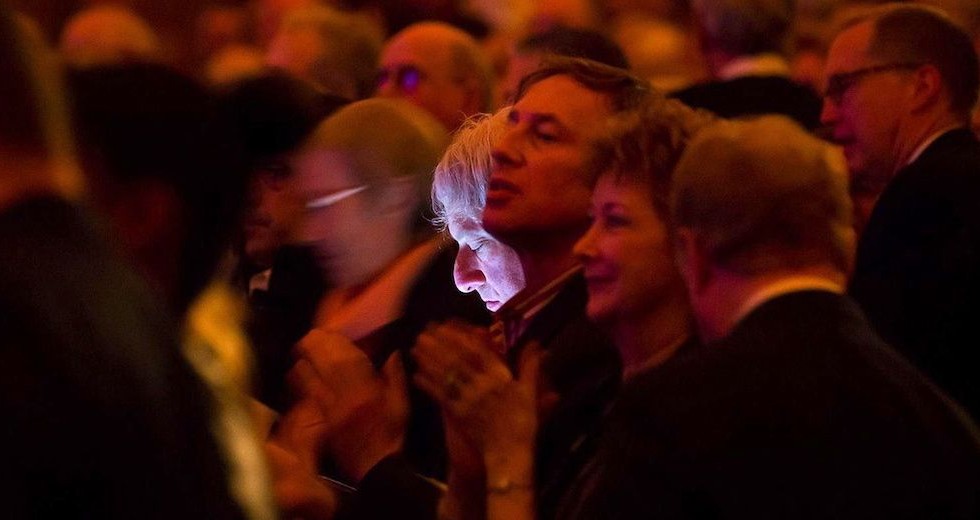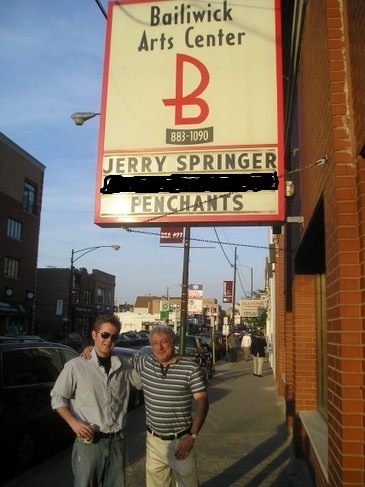
In the weeks leading up to my graduate school exams in English, I received an email from a mysterious man named Andrew Patner, who, curiously, still wrote from an AOL account. “That’s Rentap@aol, Patner spelled backwards,” he would say on his WFMT radio show, always inviting interaction.
I was relatively new to Chicago and writing a blog about classical music, but I was insulated with my studies and oblivious to Chicago’s various arts personalities.
Andrew’s message to me was open and endearing, trademark winking emoticon and all, but its intentions unclear. Who was this man and what might he want from an amateur blogger?
After a few introductory exchanges, I still wasn’t sure, but the banter became snappy and fun. When he asked me about the content of my exam, Northrop Frye’s name came up. He wrote back immediately with: “Remember, the answer is always C: Canadian.” We talked baseball: He was old school and enjoyed pitchers’ duels. He showed a keen interest in my family’s century-old hotel in Iowa, which once lodged the poet T.S Eliot. He was writing because he found my blog, and that my frivolous remark on Jean-Yves Thibaudet’s very Frenchy “frosted tips” had cracked him up. Then he came clean: he wondered if I was interested in a writing opportunity at the Chicago Sun-Times, where he had written for since 1991. I was floored.
I first met Andrew over Chinese food in his neighborhood of Lincoln Square. He showed up in an ancient Toyota coupe, which I would subsequently see around town without a headlight or hubcap. (Material gain and slick presentation didn’t interest Andrew.) After lunch he invited me to his house, his office crammed with back issues of myriad publications. There I witnessed his demand. I met his personal assistant. His phone rang constantly. During one call he passionately questioned the programming of an upcoming chamber concert series. Sometimes he let the answering machine take it, which forced listeners to digest 30 seconds of string music before the protracted “beeeeep.”
Then we talked pop music; we both adored The Beatles, and he lent me Allan Kozinn’s book on the Fab Four: “Read him,” he said, “that’s how you write concisely about music.” He loved soul, too. I mentioned that I always liked Sam Cooke’s “Bring It on Home to Me,” and he sang Lou Rawls’ howling bass lines to me. Less shocked this man was singing to me, I was stunned to learn that Rawls was even on the track, but Andrew knew. He always knew more about the things I thought I knew about.
Andrew — who constantly read, socialized, listened and observed — still made time to call, write and meet with me about my writing. One morning he called concerned. He bought me lunch to discuss a review in which I perhaps unfairly maligned the performance of a young conductor. Together, we went through every single line of my piece, which had already been published, so he wasn’t even doing damage control. He only wanted to help. He never questioned my critical opinions, only valued fairness above all. Anyone who understood Andrew’s sense of justice about the world would say this fueled his day-to-day living.
Admittedly, Andrew’s sharp knowledge on what I perceived as almost everything both fascinated and intimidated me. Not from tone or intent — never that! — but simply from his energy, high standards and acumen. (The first radio interview I listened to of his was with super-brainy-scholar Charles Rosen.) In the early days, he recommended I contact Gene Pokorny (CSO principal tuba player) about a story I was pursuing. Thinking he said “Jean,” I referred back to the tubist using a feminine pronoun. “Oh, Bryant, it’s G-E-N-E,” he said almost apologetically.
Andrew’s unexpected death last week makes me replay over and over our last encounter. It was in July 2011, and I had accepted an offer to teach college English that August in the Texas panhandle. Despite the encouragement and financial support of my parents, I fretted over retirement savings on a freelancer’s pittance. I was deeply uneasy about this decision — about leaving the city and career I loved.
By happy chance, I ran into Andrew at a Grant Park concert. He offered me a ride home, and some advice along the way: paths should never be predictable, he said, and I ought to experience “Lubbock” (I was heading to Amarillo, and he knew it.) For Andrew, the pursuit of new experience and new knowledge was tantamount to breathing.
We pulled off Lake Shore onto my darkened street, and Andrew, ever the walking Chicago encyclopedia, noticed, for the first time, the tiny “Urantia Foundation” placard on a building about a half-block from my apartment. The Urantia book is the mystical text that inspired Stockhausen’s epic opera Licht, and Andrew ruminated feverishly about the connection. Here I was: witnessing a teacher and mentor to so many people, actively learning and discovering for himself. That was Andrew: eyes open all the time, constantly connecting and sharing. We said goodbye for the last time, and I walked inside my front door recharged and excited about the next step in my journey — just as I had been when he emailed more than four years earlier.
What a generous man Andrew Patner was to us all.
TOP: Andrew Patner is illuminated by glow of his iPad (to his immediate right, Tom Bachtell, his longtime partner). | Todd Rosenberg Photography
